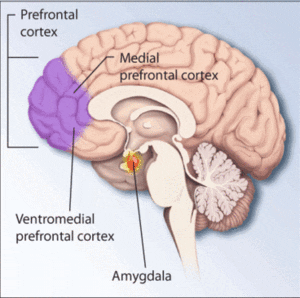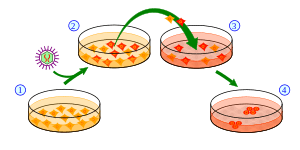
Has the potential to have clinical implications for the way individuals with posttraumatic stress disorder are treated
Reducing fear and stress following a traumatic event could be as simple as providing a protein synthesis blocker to the brain, report a team of researchers from McLean Hospital, Harvard Medical School, McGill University, and Massachusetts General Hospital in a paper published in the March 4 issue of Proceedings of the National Academy of Sciences.
“This is an important basic neuroscience finding that has the potential to have clinical implications for the way individuals with posttraumatic stress disorder are treated,” said Vadim Bolshakov, PhD, director of the Cellular Neurobiology Laboratory at McLean Hospital. “We used a well-known behavioral paradigm that we think models PTSD, fear conditioning, to explore how fearful memories are formed. In our study, the level of fear exhibited by experimental subjects was significantly reduced as a result of decreased signal transfer between cells in the amygdala, a key brain region in fear-related behaviors.”
Influenced by the original findings of Karim Nader, PhD, professor of Psychology at McGill University, whose pioneering work showed that old memories should be un-stored in their brain after their recollection in order to last, Bolshakov’s team exposed rats to auditory stimulus that the animals learned to associate with a mildly traumatic event. After a single exposure to the training procedures, the rats exhibited fear during subsequent exposures to auditory stimuli. The researchers then provided the animals with rapamycin, a protein synthesis blocker, immediately after memory was retrieved in order to control bonding between the cells in the brain. The animals exhibited significantly less fear in response to the fear-invoking stimulus when retested the next day.
“The animals showed stereotypical signs of fear after the initial exposure to the auditory stimulus,” explained Nader, a co-author on the paper. “Following the administration of rapamycin, we show a significant decrease in fear, but not a complete elimination. We were surprised to note that activity between cells was significantly affected by postsynaptic mechanisms.”
The Latest Bing News on:
Posttraumatic stress disorder
- ‘They just wanted their moms:’ Mother survived deadly Hays bus crash, recounts tragic dayon April 27, 2024 at 1:06 pm
The special education aide at Tom Green Elementary in Buda had helped gather the group of more than 40 children into a single-file line, including her 5-year-old daughter. She guided them to their ...
- Minneapolis Approves PTSD Settlement for George Floyd Witness Who Faced Police Intimidationon April 27, 2024 at 10:29 am
In an act that echoes the ongoing reckoning with police brutality and systemic racism in the United States, the Minneapolis City Council has approved a significant settlement for Donald Williams, a ...
- Youth center victim seeking $1.5M for treatmenton April 27, 2024 at 8:34 am
A medical expert called to testify for David Meehan in his trailblazing lawsuit against the state testified Thursday he will need life-long Post Traumatic Stress Disorder treatment costing ...
- ‘Troubling reports’ of abuse at Michigan ICE facility prompt call for investigationon April 27, 2024 at 7:30 am
Under the ICE’s last inspection, the Calhoun County Jail received a rating of “meets expectations” in March 2022. Over a two-day period, inspectors interviewed eight detainees who said they felt safe ...
- California should legalize psychedelics but learn from mistakes in marijuana regulationon April 27, 2024 at 1:00 am
There is a growing body of medical research showing psychedelic-assisted therapies can be tremendously effective at helping treat anxiety, severe depression, post-traumatic stress disorder, substance ...
- Minneapolis approves $150K settlement for witness to George Floyd's murderon April 26, 2024 at 9:43 am
The Minneapolis City Council has agreed to pay a $150,000 settlement to an eyewitness who tried to intervene to prevent George Floyd’s murder and who says he suffers from post-traumatic stress disorde ...
- Hobart workplace investigator says her job caused vicarious trauma and post traumatic stress disorderon April 25, 2024 at 7:49 pm
A workplace investigator has failed to prove she was unfairly dismissed after being subjected to trauma as part of her job – including being harassed by an alleged sex offender, her home being ...
- Breakthrough study on post-traumatic stress disorderon April 25, 2024 at 12:35 pm
A UC San Diego-led collaboration of researchers, institutions and databases makes advances on the understanding of the genetic component of PTSD.
- Dozens of genes are linked to post-traumatic stress disorderon April 21, 2024 at 5:00 pm
Findings underscore that genetic factors contribute to development of the condition after a traumatic incident.
- April is Stress Awareness Monthon April 15, 2024 at 8:36 pm
It is shown that Veterans of the same service era who are deployed are three times more likely to be diagnosed with PTSD versus ones who were not deployed. Data from older studies suggests PTSD is ...
The Latest Google Headlines on:
Posttraumatic stress disorder
[google_news title=”” keyword=”posttraumatic stress disorder” num_posts=”10″ blurb_length=”0″ show_thumb=”left”] [/vc_column_text]The Latest Bing News on:
PTSD treatment
- Youth center victim seeking $1.5M for treatmenton April 27, 2024 at 8:34 am
A medical expert called to testify for David Meehan in his trailblazing lawsuit against the state testified Thursday he will need life-long Post Traumatic Stress Disorder treatment costing ...
- PTSD professor details own experiences in the wake of Bondi Junction fatal stabbingson April 26, 2024 at 6:58 pm
It was the deadly mass shooting that left 14 women dead, 14 others wounded and changed Alain Brunet’s life forever.
- PTSD tied to 95 'risk hotspots' in the genomeon April 26, 2024 at 1:00 pm
In a group effort, scientists from all over the world came together to create a detailed map of the genetic causes behind PTSD.
- Wayne Rooney reveals bizarre bedtime routine as Man Utd fans claim club legend is still suffering ‘Fergie PTSD’on April 26, 2024 at 12:00 pm
WAYNE ROONEY has blown away Alex Ferguson as the main man with a hairdryer – after revealing an astonishing bed-time habit. The former England skipper admits he is an unusual ...
- JPMorgan CEO Jamie Dimon reveals he has ‘PTSD’ from ‘near death’ heart surgery: ‘I knew it was 50/50’on April 26, 2024 at 8:43 am
JPMorgan Chase CEO Jamie Dimon admitted that he has “PTSD” from a “near death” heart surgery that took place in 2020. “When I was being wheeled in the operating room for the dissection, I knew it was ...
- Medical Expert Says Meehan Needs $1.5M for Lifelong PTSD Treatmenton April 25, 2024 at 3:23 pm
A medical expert called to testify for David Meehan in his trailblazing lawsuit against the state testified Thursday he will need life-long Post Traumatic Stress Disorder treatment costing up to $1.5 ...
- PTSD crisis looms as troop shortages take toll on Ukrainian soldiers’ mental healthon April 25, 2024 at 1:43 pm
The situation wasn’t particularly dangerous, but she couldn’t bring herself to do her job as her fellow soldiers were getting wounded. "I found myself trapped in the dugout corner, trembling like a ...
- Doctor testifies at YDC trial about plaintiff's PTSDon April 25, 2024 at 1:15 pm
A forensic psychiatrist will resume her testimony Thursday in the civil trial involving the state's Youth Development Center and claims of physical and sexual abuse there.
- Breakthrough study on post-traumatic stress disorderon April 25, 2024 at 12:35 pm
A UC San Diego-led collaboration of researchers, institutions and databases makes advances on the understanding of the genetic component of PTSD.
- GrayMatters Health Wins Edison Gold Award for its Innovative PTSD Treatmenton April 22, 2024 at 5:00 am
GrayMatters Health (GMH), developer of digital self-neuromodulation treatments for mental health care, today announced its flagship FDA-cleared device Prism for PTSD has been named a Gold winner of ...
The Latest Google Headlines on:
PTSD treatment
[google_news title=”” keyword=”PTSD treatment” num_posts=”10″ blurb_length=”0″ show_thumb=”left”]









